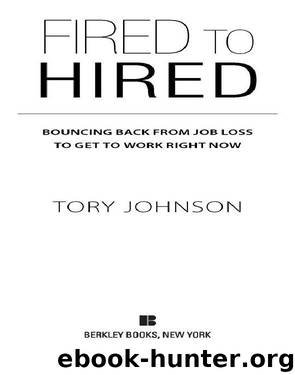Fired to Hired: Bouncing Back From Job Loss to Get to Work Right Now by Tory Johnson

Author:Tory Johnson [Johnson, Tory]
Language: eng
Format: epub
Tags: General, Psychological aspects, Business & Economics, Psychology, Interpersonal Relations, Entrepreneurship, Job Hunting, Careers, Self-presentation, Employment interviewing, Home-Based Businesses, Job hunting - Psychological aspects
ISBN: 9780425230558
Publisher: Penguin
Published: 2009-08-04T15:02:21.806000+00:00
Ah!: ʺIʹm taking a class to keep up on the latest technology because thatʹs how the world operates today.ʺ
LEARN FROM THE YOUNG‘UNS
You may have entered the workforce when time served drove raises and promotions. It doesn’t work that way anymore. Twentysomethings change jobs every 18 months, and the average American will have held 10 positions between the ages of 18 and 38, according to the Bureau of Labor Statistics. Because they are used to these short stints, they believe performance and results should drive compensation and promotion. They’re more apt to ask for a raise after doing a great job on a big project after only six months. They have no qualms about asking to leapfrog titles and positions without regard to protocol that was historically based on age.
The same is true if you work for a younger person. The boss’s perspective—not yours—will likely determine raises and promotions. In an interview, you should ask the boss outright what his or her philosophy is on awarding raises and promotions. “What must I do to earn more money or be promoted?” Asking directly helps avoid any misunderstandings, and lets the boss know that you are eager to get to work hard and succeed.
Victim Language
ʺItʹs so easy to feel like a victim. Feeling guilty is a waste of time,ʺ says Good Morning Americaʹs financial contributor Mellody Hobson. ʺYou choose your life, and if you donʹt like something, you can choose to change it.ʺ
At her Chicago financial services firm, Ariel Investments, Mellody says colleagues call each other out when they hear ʺvictim language.ʺ
Example?
Iʹll say, ʺWow, that client was just so mean to me,ʺ and my colleagues will say, ʺvictim languageʺ because thatʹs how I chose to interpret the conversation. I didnʹt have to interpret it that way. We donʹt accept it when an employee blames someone else for something not getting done. Thatʹs ʹvictim language.ʹ ʺ
Download
This site does not store any files on its server. We only index and link to content provided by other sites. Please contact the content providers to delete copyright contents if any and email us, we'll remove relevant links or contents immediately.
| Business School Guides | GMAT |
| Guides | Interviewing |
| Job Hunting | Job Markets & Advice |
| Resumes | Vocational Guidance |
| Volunteer Work |
The Motivation Myth by Jeff Haden(5212)
Audition by Ryu Murakami(4930)
Adulting by Kelly Williams Brown(4574)
The Confidence Code by Katty Kay(4260)
A Mind For Numbers: How to Excel at Math and Science (Even If You Flunked Algebra) by Barbara Oakley(3307)
Waiting in the Wings by Melissa Brayden(3218)
Self-Esteem by Matthew McKay & Patrick Fanning(3144)
Fooled by Randomness: The Hidden Role of Chance in Life and in the Markets by Nassim Nicholas Taleb(3124)
The ONE Thing by Gary Keller(3071)
Nice Girls Don't Get the Corner Office by Lois P. Frankel(3044)
The Dictionary of Body Language by Joe Navarro(2996)
How to be More Interesting by Edward De Bono(2791)
Designing Your Life by Bill Burnett(2746)
Getting Things Done by David Allen(2700)
The Plant Paradox by Dr. Steven R. Gundry M.D(2620)
Police Exams Prep 2018-2019 by Kaplan Test Prep(2548)
What Color Is Your Parachute? 2015 by Richard N. Bolles(2311)
Dangerous Personalities by Joe Navarro(2289)
When to Jump by Mike Lewis(2241)
